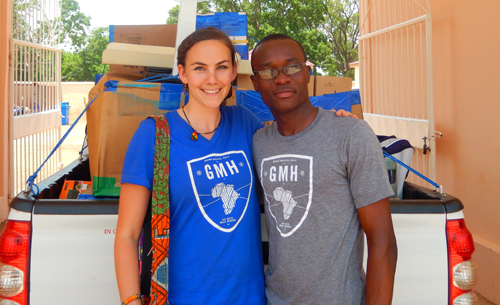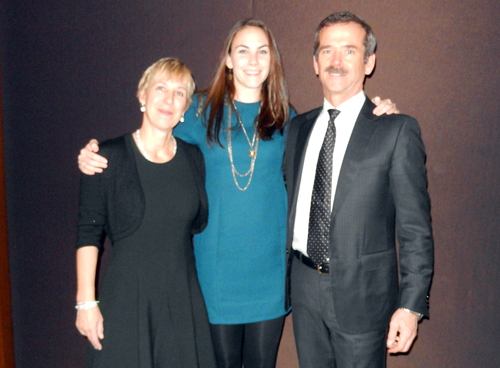
“Happy birthday from the space station, hope you’re having a great birthday, from Uncle Chris.”
At first, Kelly Hadfield was upset that she’d missed the May 4 call from her uncle. Canadian astronaut Chris Hadfield had only dialed all the way from the International Space Station, where he was serving as commander during this year’s mission.
But her upset was short-lived. She had already received a couple of long-distance calls from Uncle Chris since he blasted off to the station last December. And now she had her uncle’s birthday greeting from low-Earth orbit recorded on her phone to hear whenever she liked.
Now that he’s back on Earth, they talk more often.
One current topic of conversation is a three-year-old non-profit organization run by Kelly that sends needed medical supplies to under-served parts of Ghana. This year’s proceeds from speaking engagements and book sales involving Uncle Chris now promise to provide additional tens of thousands of dollars’ worth of equipment to the West African country.
For Kelly Hadfield, all roads lead to Africa for humanitarian and research projects.
Now completing her master’s degree in integrative biology, she has used DNA barcoding to identify mosquito species to fight malaria in the Kenyan highlands.
She began working on that project while studying biomedical science for her undergrad. There’s a distance between that academic program and the made-in-Guelph initiative to catalogue living species based on Guelph-developed DNA barcoding technology.
But Hadfield says she relishes jumping into new challenges. The same impulse led her to a fourth-year research project in human kinetics with Prof. Coral Murrant, Human Health and Nutritional Sciences.
“I like to diversify my research. No matter what field, research is fascinating because you’re doing something nobody has ever done before.”
Along with integrative biology professor Ryan Gregory, she started studying genome-size diversity in aquatic insects used by scientists to indicate environmental pollution. That work led to her master’s project on detecting malaria-bearing mosquitoes in Kenya.
Barcoding technology uses small amounts of genetic material to pinpoint particular mosquito species quickly and efficiently. “It has the potential to be a powerful tool.”
She also provided DNA barcodes to the Barcode of Life Database. That global genetic reference library held at U of G’s Biodiversity Institute of Ontario (BIO) allows researchers to identify organisms based on telltale snippets of genetic material. Her research was partly sponsored by BIO.
She found 27 species of Anopheles mosquitoes during her project in Kenya. Using conventional methods to distinguish them is a challenge. Seven species look identical, but several transmit malaria while others do not.
“Mistakes can be dangerous,” says Hadfield. “If you think it’s a malaria vector but then find out it’s not, if you pour money in, that’s an economic waste.”
She spoke about her project during a national entomology conference at Guelph this fall.
The project took place in the Kenyan highlands. As climate change and human impacts enable mosquitoes to move into new regions, those insects bring the threat of malarial epidemics to areas lacking immunity.
Her earlier taste of Africa occurred on the other side of the continent.
She first visited Ghana in 2010 as a third-year student. She travelled to West Africa with Operation Groundswell, a volunteer not-for-profit group that enables participants to carry out community service worldwide.
The experience offered highs and lows.
Hadfield spent time at a national cardiothoracic centre in a hospital in the capital, Accra. “I fell in love with cardiology.”
What really hit her heart was Moses, a 12-year-old boy who died of a snake bite. Hadfield blamed the lack of basic equipment for his “preventable” death.
“I got so mad. I knew he would never have died in any basic facility in Canada. I still can’t handle the thought. The very next day, I simply resolved to change it.”
She blitzed hospital staffers, asking what supplies they needed most. The items were modest: tongue depressors, blood pressure cuffs and the like. Her next step: “I came home to raise money.”
Hadfield now runs Ghana Medical Help (GMH). The organization raises money to provide equipment and training to hospitals and clinics, including remote regions with few resources or health professionals.
The number of patients treated daily during the rainy season has risen by more than 30 per cent. Mortality rates have fallen, staff morale has improved and people now show greater faith in the health-care system. “It was as clear as day, the impact was astonishing.”
She’s now working with the Quebec-based National Optic Institute to make its new, portable flow cytometers available to Ghana. Doctors use the equipment to sort and count cells, including blood samples.
She connected with the company through her uncle, who has used these toaster-sized devices for experiments in space. Donated cytometers will allow GMH to conduct the first-ever study of the technology in those isolated communities.
GMH raises about $30,000 a year. Hadfield hopes that figure will at least double this year. Among other sources, her Uncle Chris has pledged proceeds from a speech he gave in Toronto earlier this month, as well as proceeds from GMH sales in November and December of his new book, An Astronaut’s Guide to Life on Earth.

Hadfield does her own share of co-ordinating and speaking at fundraisers, usually about three times a month. On campus, she spoke earlier this year during residence life staff training. In 2014, campus residences plan to run a fundraising event called From Guelph to Ghana.
Chris Hadfield visited space three times, including serving as commander of the International Space Station this year.
Adventure and flight run in the family. Her father is an Air Canada pilot (a bonus for Kelly’s discount flights to Africa). Other pilots in the clan include Uncle Chris and her other paternal uncle, as well as her mother and grandfather.
A former air cadet, Kelly has flown small craft herself. The family owns two planes that they fly out of a farmer’s field at home in Utopia, a hamlet near Barrie, Ont.
For her grandmother’s 80th birthday, most of the family visited South Africa in 2007. Five years later, they marked another milestone birthday for Grandma with a group trek to Southeast Asia.
Kelly visited Florida in 1995 to watch the space shuttle launch her uncle into space for the first time. Just eight years old then, she regarded the event as no big deal. “That was a normal event to me, I barely remember it.”
She attended Chris’s second shuttle launch in 2001. Then 12, she was a little less sanguine. “It’s scary. Everyone’s just crossing their fingers. Same with the landing.”
Last December, he blasted off once more aboard a Russian Soyuz spacecraft bound for the space station. “I was in Milton with family watching online.”
In 2011, she became West African program co-ordinator for Operation Groundswell. After finishing her master’s thesis this fall, she will become the organization’s fundraising co-ordinator.
She’s applying to medical school and hopes to practice pediatrics in northern Canada to help improve health care in underprivileged communities.